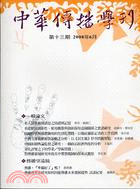 閱覽人數: 1737
閱覽人數: 1737
June
2008
No. 13
頁數:3 - 35
作者(中)
蔡琰、臧國仁
作者(英)
Yean Tsai & Kuo-Jen Tsang
關鍵詞(中)
老人 ; 情感 ; 記憶 ; 新聞
關鍵詞(英)
gerontology ; news ; emotion ; memory
中文摘要
本文旨在討論老人觀眾接收新聞訊息的特質,試圖思辨「情感」與「記憶」在老人訊息接收之角色。研究者認為,老人與媒介訊息互動較強的部分是媒體轉介之情感,而情感與記憶相關。 透過深訪二十位台灣都會區老人,本研究發現個人與社會互動之現有理論,似難完整解釋老齡閱聽眾如何與社會交換訊息:老人既不認為新聞報導內容符合其所認知的老人生活「真相」,也不認為媒介提供了適合老人的內容。訪談結果顯示,傳播媒介若重視老齡閱聽眾市場,未來宜多提供「家庭」與「健康」主題。 其次,老人之所以對新聞產生興趣,多出自於情感,如「關心」其他老人;而老人讀完新聞後,也屢對其個人生命史及個人知識庫產生豐厚記憶與聯想。
英文摘要
A theory on the interaction between news stories and elderly people in Taiwan urban areas is proposed and examined. Twenty subjects aged from 65 to 85 are interviewed and tested on their reactions toward various types of local news. It is observed that current theories on social interaction do not fully account for the communication behaviors of the elderly. According to our study, our informants were of the opinion that the media did not reflect a reliable image of the elderly and did not provide needed information. The media are urged to provide information on family life and health. The present study also surveys the role of emotion and memory during the reception process. It is found that emotion plays an important part in helping the informants decide on which stories to read. Whether the media care for the elderly and are able to entertain them are reported as the main reasons for choosing reading materials. Finally, emotional reaction towards a news story is related to the amount of information which a subject can remember after reading the news.